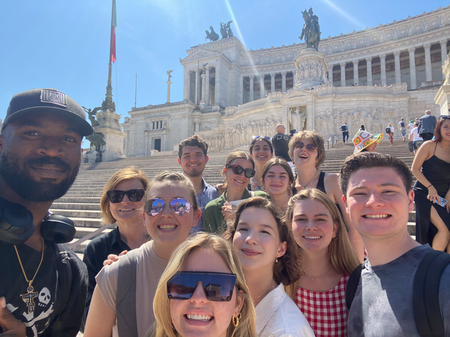
Samford University students will have the chance to walk in the footsteps of emperors and pharaohs through two upcoming study abroad programs in Rome and Egypt during May 2026. Both programs invite students to immerse themselves in the heart of ancient civilizations while uncovering their continuing impact on the modern world.
Led by Howard College of Arts and Sciences professors Doug Clapp, Betsy Dobbins and Jennifer Speights-Binet, Eternal Rome will provide students a firsthand look at one of history’s most influential cities. Participants will explore ancient ruins, encounter artistic treasures in world-renowned museums and visit early Christian basilicas that still echo with centuries of faith and culture. Students will journey through the story of physical and cultural change in the Eternal City, gaining insight into its complex development and profound significance for life in the 21st century.
The program’s interdisciplinary approach allows students to examine Rome through multiple lenses. Dobbins, a professor in Samford's Biological and Environmental Sciences Department, Wilton H. Bunch Interdisciplinary Faculty Fellow and Mann Center Fellow in Community-Based Learning, will guide students in exploring topics such as urban ecology and public health, including testing water quality in ancient fountains.
“Ancient and modern civilizations face similar challenges in supporting safe and healthy spaces for dense populations in cities,” Dobbins said. “A healthy city provides clean water and waste disposal, public spaces including green spaces for mental health and ways to mitigate disease caused by overcrowding, epidemics and changing environments.”
Speights-Binet, professor and chair of Samford's Geography and Sociology Department, will highlight the city’s social and cultural landscapes, while Clapp, professor and Chair of Samford's Classics and Philosophy Department, will focus on the humanities and historical meaning found in Rome’s art, literature and sacred spaces. Students may earn general education credit in natural science, social science or humanities, depending on their chosen area of emphasis.
Across the Mediterranean, Howard College Dean Dawn McCormack will lead Egypt: A Journey Through Time, an exploration of one of humanity’s oldest and most fascinating civilizations. Students will travel through Cairo, Luxor and Aswan, tracing Egypt’s history from the ancient pyramids to the complexities of its modern society.
“Egypt is a fantastic place to discover things you never could have imagined,” McCormack said. “You can stand before the pyramids or King Tut’s treasures and see how the ancient Egyptians expressed what mattered most to them—their beliefs, ambitions and longing for the divine. When students experience that, they start asking what our own buildings and creations say about us. It’s a powerful reminder that people then and now aren’t so different.”
Both programs reflect Samford’s commitment to helping students connect timeless ideas with contemporary life. By walking through temples and ruins thousands of years old, students discover that ancient civilizations still speak to the challenges and aspirations of today.
Applications for both programs open Oct. 17 and close Dec. 4 at abroad.samford.edu. Students may receive CLAS 304 credit for the Rome program and INTL 399 credit for the Egypt program.
GIVE: Support impactful work at Howard College of Arts and Sciences.
